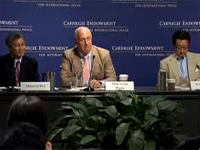Registration
You will receive an email confirming your registration.
The Beijing Olympics mark China’s emergence as a global leader, but present risks that could mar its reputation. To explain those risks and their potential impact on the Chinese government, Carnegie hosted an event with Victor Cha, director of Asian studies at Georgetown University, and Carnegie’s Minxin Pei and Douglas Paal. Risks discussed include logistical organization, pollution, security, and political protests.
How The Olympics Will Change China
Cha explained that while the Games are a “coming out party” for China – akin to the 1964 Tokyo or 1988 Seoul Olympics for Japan and South Korea respectively – the Olympics’ will inevitably be politicized since much of the world disputes the Chinese Communist Party’s (CCP) illiberal regime.
Cha listed four criteria that will determine whether the Games will be a success for China: 1) the number of medals Chinese athletes win, 2) the level of air quality, 3) the ability to host the games well in terms of logistics and operations, and 4) the marginalization of political protests.
Regardless of its performance on these four measures, Cha was confident that “China will be a different country” when the Games conclude. The same Olympic spotlight that showcases China’s modernization and economic strength will permit scrutinizing journalists and tourists to increase international pressure for political liberties.
The CCP’s Mixed Performance
Pei, who recently visited Beijing to document the final stage of the government’s $41 billion investment in the Games, noted not only the efforts to improve air quality and improve infrastructure, but also the extra-tight new security measures implemented across the city. For example, over half-a-million government personnel, private security, and volunteers have been mobilized to provide security for the Games.
Pei went on to grade the government’s success thus far within four of his own categories: 1) an A- for organizational effectiveness, 2) a D or an F for air quality, 3) an A- for security, and 4) a B- or C+ for image management.
The Role of Nationalism
During the question and answer period, Pei and Cha discussed how the build-up to the Games served to bolster solidarity among the Chinese people. Pei pointed out that the CCP will try to manage nationalism by controlling TV images, but Cha warned that while citizens have rallied around the CCP thus far, much of the turmoil in China during the 20th century was fueled by nationalism. If uncontrolled, nationalism could become the CCP’s greatest risk to its political power.
